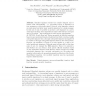Free Online Productivity Tools
i2Speak
i2Symbol
i2OCR
iTex2Img
iWeb2Print
iWeb2Shot
i2Type
iPdf2Split
iPdf2Merge
i2Bopomofo
i2Arabic
i2Style
i2Image
i2PDF
iLatex2Rtf
Sci2ools
119
click to vote
CTRSA
2007
Springer
2007
Springer
How to Strengthen Any Weakly Unforgeable Signature into a Strongly Unforgeable Signature
Standard signature schemes are usually designed only to achieve weak unforgeability – i.e. preventing forgery of signatures on new messages not previously signed. However, most signature schemes are randomised and allow many possible signatures for a single message. In this case, it may be possible to produce a new signature on a previously signed message. Some applications require that this type of forgery also be prevented – this requirement is called strong unforgeability. At PKC2006, Boneh Shen and Waters presented an efficient transform based on any randomised trapdoor hash function which converts a weakly unforgeable signature into a strongly unforgeable signature and applied it to construct a strongly unforgeable signature based on the CDH problem. However, the transform of Boneh et al only applies to a class of socalled partitioned signatures. Although many schemes fall in this class, some do not, for example the DSA signature. Hence it is natural to ask whether one can obt...
Related Content
| Added | 07 Jun 2010 |
| Updated | 07 Jun 2010 |
| Type | Conference |
| Year | 2007 |
| Where | CTRSA |
| Authors | Ron Steinfeld, Josef Pieprzyk, Huaxiong Wang |
Comments (0)

